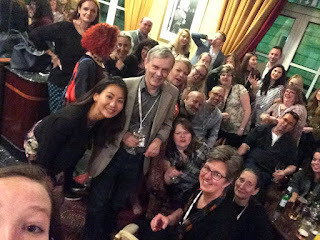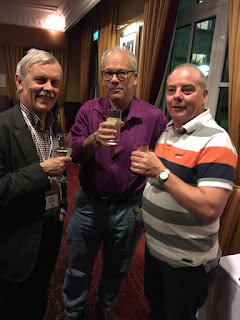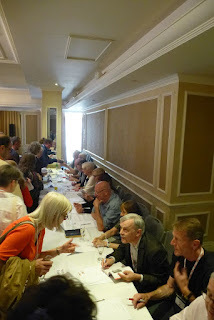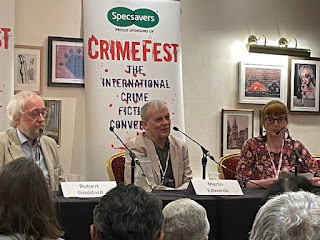Martin Edwards's Blog, page 6
June 9, 2025
25 Years of Stark House Press
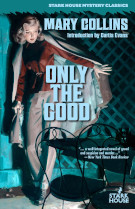
It seems hard to believe, but Stark House Press (like Murder Squad!) recently celebrated its 25th anniversary. Greg Shepard and his associates, such as Rick Ollerman, have done a great job over the years in creating a list which reprints a wide range of interesting examples of crime fiction. Along with Jeff Marks and Doug Greene of Crippen & Landru, they have done crime fans a great service.
For instance, they have republished books by authors as different as Elisabeth Sanxay Holding, a wonderful exponent of domestic suspense and a writer who remains criminally under-valued (as is Nedra Tyre, another author on the list), and Gil Brewer, whose work has a harder edge than that of Holding and Tyre, but a distinctive quality. The Red Scarf, for instance, is absolutely gripping.
In terms of non-fiction, I can recommend, for instance, Rick Ollerman's Hardboiled, Noir and Gold Medals: essays on crime fiction writers from the 50s through the 90s. This collection of essays demonstrates Rick's insightful approach to crime criticism and is packed with interesting information. Among more recent writers, the late Ed Gorman has a Stark House 'twofer' - two novels in one book - which includes one of my favourites of his, The Night Remembers.
Another domestic suspense specialist who has been well served by Stark House is the excellent Jean Potts. I can also recommend Patrick Quentin's Death Freight and other Murderous Excursions, a collection of four novellas while Rick's advocacy on behalf of Peter Rabe, a really interesting writer, has seen publication of various Rabe novels. Recent publications include two books by a writer I don't know at all, Mary Collins, The Sister of Cain and Only the Good, which I'm about to start reading.
In short, if you're a crime fan with an interest in books of the past, you're sure to find something of interest on the Stark House list. Long may it continue to thrive.
June 6, 2025
Forgotten Book - Death and Mary Dazill
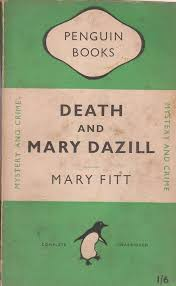
I have mixed feelings about Mary Fitt's crime fiction. Some of her books, such as Mizmaze, strike me as hopeless, but she was capable of writing very well. What is more, she had the ambition to stretch herself and try out different forms of storytelling. One of her better-known books, Death and Mary Dazill (1941) is a case in point. It's a sort of cold case mystery, with a historical crime investigated by her series characters Superintendent Mallett and Dr Fitzbown. But its great strength lies in the characterisation and atmosphere.
The story opens with Mallett and Fitzbown attending a colleague's funeral. They are struck by the sight of two elderly women carrying a wreath to someone else's grave. The vicar tells them that they are the de Boulter sisters, Lindisfarne and Arran (great names!) and they were connected with a sequence of deaths when they were on the cusp of adulthood.
Curiosity aroused, Mallett and Fitzbown want to find out what happened. The vicar's wife knows the story, because her mother Lucy was a close friend of 'Lindy' and Arran, as well as their brother Leonard and another young man called John. But their lives were torn apart when their widowed father brought into their home an attractive and seemingly demure young woman called Mary Dazill.
The story is told mainly in flashback, and on the whole I think Fitt handles a tricky structure very well indeed. The book is fairly short and although she wasn't the paciest of writers, I found it very readable. The ambiguities of the storyline weren't, to my mind, irritating, as they would be in a novel written by a less talented author. Every now and then we flip back to the present day, with Mallett operating in effect as an armchair detective. This is an unorthodox novel and as good as anything I've read from this interesting if variable author.
June 4, 2025
The CWA Short Story Dagger
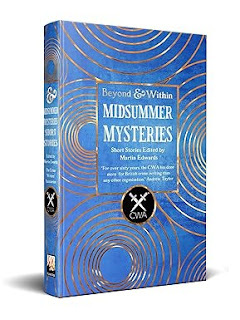
The CWA Short Story Dagger holds a special place in my heart for a number of reasons. It was the very first major award that I won for my crime writing, thanks to 'The Bookbinder's Apprentice', and I've had three other stories shortlisted for the award. But more than that, I've edited anthologies which have yielded quite a lot of stories that have made the longlist and shortlist, as well as a number of winners.
There's a real pleasure to be had from editing an anthology of new short stories (and quite a lot to be had from editing stories from days gone by for the British Library, but that's a slightly different matter). In the course of editing more than fifty collections I've had the pleasure of receiving some brilliant stories by writers from all around the world. The only downside of editing, say, the CWA anthology, is that one has to turn down a number of good stories because of constraints on space and sometimes because of the need to achieve a suitable mix of styles, settings, and storylines. It's especially hard turning down stories written by friends. It's happened to me, so I know how it feels. But you have to respect the editorial judgment and equally it's important for the editor to try to be as fair as possible to the authors as well as devoting careful thought, as I try to do, to the nature of the reader's experience on delving into the book.
I had a great time editing the most recent (and possibly most gorgeous-looking!) CWA anthology, Midsummer Mysteries, though again some good stories didn't make the cut. And I'm absolutely thrilled that no fewer than four stories from the book have reached the shortlist of six for the Short Story Dagger. Quite a result. They are all terrific stories, and indeed I can think of several others in the book that must also have been very strong contenders (judging awards is never easy, that's for sure). So warmest congratulations to Bill McCormick, Sophia Bennett, Jamie Bernthal, and Meeti Shroff Shah. And thanks to the hard-working team at Flame Tree Press who made it all possible.
The first story I edited that won this Dagger was 'Herbert in Motion' by a talented young guy called Ian Rankin. Since then there have been John Harvey's 'Fedora' and Len Tyler's 'The Trials of Margaret' - and a special bonus came when stories written by Margaret Murphy and Cath Staincliffe for my Murder Squad anthology Best Eaten Cold shared the Dagger. So I'm keeping my fingers crossed that one of the quartet of stories from Midsummer Mysteries will win the award - but whatever the outcome, I'm delighted that the achievements of these excellent writers have been recognised in this way.
June 2, 2025
Back in Britain
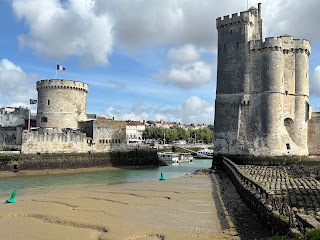
I'm back home after a short but hugely enjoyable cruise when I was a speaker - or 'conversationalist', to use the company's rather nice term - on the Seabourn Sojourn. I was introduced to Seabourn as a prospective speaker by my pals Ann Cleeves and Louise Penny, and they were absolutely right to sing the company's praises. Everyone I have dealt with has been delightful and the whole experience was very positive.

In fact, the original idea was that I'd do a cruise with Seabourn some time in 2026. However, someone dropped out, and I had a few days free in between a couple of events with Ann and my other colleagues in Murder Squad, celebrating our 25 years together. Luckily for me, all the logistics worked out, with a flight out to Bordeaux and a train trip home from Southampton.

A Seabourn cruise is a luxury experience - definitely recommended! - and the key for anyone taking part as a conversationalist is to buy into the ethos of looking after the guests on board. I was especially impressed by the care taken to look after single travellers. So in addition to two conversations - one concerning Agatha Christie and the other concerning game-playing in detective fiction - on a couple of nights I hosted tables of guests, and they proved to be really good company. When presenting, I used PowerPoint for the first time in more than twenty years (after a rather traumatic incident at work, when pitching to prospective clients and the system broke down!) and with the help of the tech team, all was well.
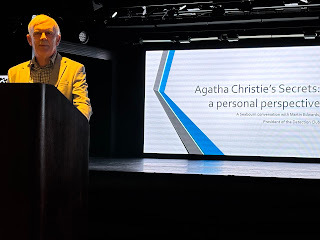
There were three stops, all of them appealing and full of character. The first was at Bordeaux, which I last visited many years ago, and the second at the delightful and historic port town of La Rochelle, which I found quite entrancing. Finally, there was St Helier on Jersey, a town I always enjoy visiting. I felt very fortunate to have had such a fun time as well as sharing my passion for Golden Age mysteries with a receptive and interesting audience.

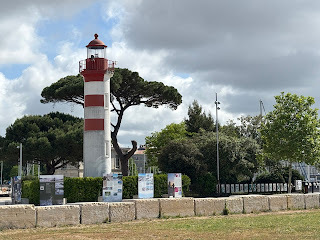
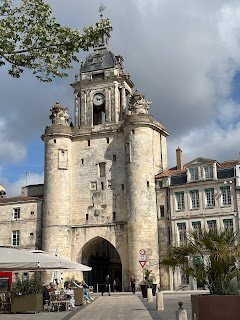





May 30, 2025
Forgotten Book - Sunspot
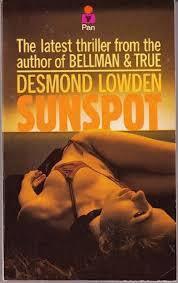
Desmond Lowden was a highly successful crime writer. He published a mere eight novels between 1969 and 1990, but several of them were made into films, perhaps the most notable being Bellman and True, and he won a Silver Dagger (in those days the runner-up prize to the Gold Dagger) for The Shadow Run. He also wrote a number of TV screenplays, both stand-alones and contributions to series such as Bergerac. Yet when he died last year, aged 86, the crime world was pretty much unaware of it (as I was until recently), and as a result paid no attention to his legacy. The fact that he'd produced no novels for thirty-five years was no doubt the reason, but I always think it's a shame when good writers are overlooked. And Desmond Lowden was definitely a good writer.
When I was in my twenties, I came across the paperback edition of his 1981 book Sunspot. The storyline looked interesting, so although in those days I bought very few books, because of lack of cash, I bought it. And I was certainly not disappointed. It's a story about a serial killer operating in a seaside town. A bit like that classic Golden Age mystery Death in Eastrepps? Well, in many ways, it could hardly be more different. But it's a well-plotted and well-characterised novel that moves at a fast pace.
Having recently re-read Sunspot, I can see that it draws heavily on Lowden's experience of writing for TV, with short and highly visual scenes, plus interesting shifts of viewpoint. There's a hapless young detective at the centre of the action who is a very appealing character. But Lowden was obviously not interested in writing a series and this may in part account for the obscurity into which his work has fallen.
On re-reading, I expected this novel to be 'of its time' (the paperback cover art certainly is) and of course, like all books, it is. But it still stands up as a clever and entertaining quick read. I imagine that Lowden hoped that it would be filmed or televised and no doubt he was disappointed when that didn't happen. He sounds like a fascinating character, who played jazz and ran a pub for a few years in the Eighties. I'd like to know more about him and to read more of his all too few books.
May 28, 2025
The Assessment - 2025 film review

The Assessment is a new film, the first to be directed by Fleur Fortune (a name that deserves to be in a Rachel Savernake novel...) and its premise is intriguing. If you had to pigeon-hole the film in a genre, you'd say it was dystopian. The story is set in the future, at a time when - due to scarce resources - would-be parents have to go through a very demanding assessment in order to be allowed to have a child.
Elizabeth Olsen and Himesh Patel play Mia and Aaryon, a couple who are desperate to have a child and they are in a select group that is eligible for assessment. The assessment takes place over seven days, but they do not know what it entails. They live in a sophisticated house under some kind of protective dome, but it emerges that there are also some people who, either voluntarily or otherwise, live outside the protected area. The lives of the elite are prolonged, very considerably, by pharmaceuticals. Mia is a botanist and Aaryon creates virtual reality pets, because domestic pets have been culled because of the risk of disease.
Virginia (Alice Vikander) arrives to stay with them for a week to conduct the assessment. She is an enigmatic individual and Mia and Aaryon struggle to figure out how to impress her. Things become more complicated when Virginia pretends to be a difficult child, tantrums and all. Gradually, the story becomes darker and darker.
So often an intriguing premise is let down by the plot development, but I really liked this movie. The script was intelligent and thought-provoking, as well as unusual and, in some respects, strange. I also thought the ending was good, although for obvious reasons I can't explain why. It's not the cheeriest film you'll ever see, not by a long chalk, and it's definitely not Star Wars. But if you're in the mood for a bleak but well-written and well-acted film, this might be for you.
May 26, 2025
Murder Squad - 25 years and still going strong (with more events to come!)
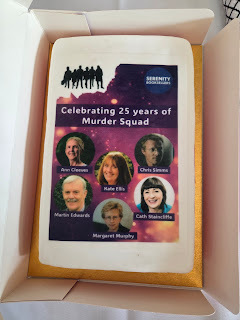
The six members of Murder Squad celebrated our 25th anniversary in style in the elegant surroundings of Stockport Guildhall last Wednesday. Ann Cleeves, Chris Simms, Kate Ellis, Cath Staincliffe, Margaret Murphy and I were all together with a wonderful audience of 145 crime fans. And there was celebratory fizz and cake!
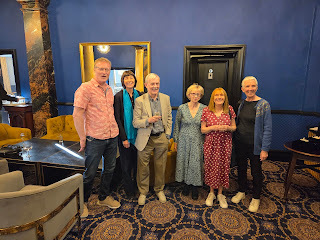
Ann acted as a sort of compere, asking us questions about our writing before talking about her next novel, which sees Jimmy Perez return - on Orkney this time! There were some great questions and we also announced the winner of the short story competition that we have been running for a new writer - of the top three entries, one came from Australia and another from the US.
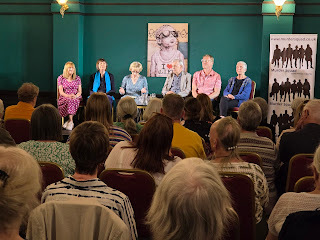
Serenity Books, who have shops in Romiley and Stockport, were the host booksellers and it was lovely to meet Chris and Kelly, who have made a great success of their business in a short space of time. And it's always great to chat to readers as one signs books. I never tire of it!
It's been quite a journey since seven of us first got together as Murder Squad - our first event was in Ellesmere Port, the second in York. Chaz Brenchley and John Baker retired from crime writing and sadly the delightful Stuart Pawson died, but Kate and Chris came to join us. It's quite something to have kept together for a quarter of a century and we've had some wonderful times along the way.
And there are more to come! Starting with an online celebration on 31 May - please do come and join us - the link is here.
If that isn't enough, Kate, Margaret and I will be appearing together at Halifax Central Library on 5 June - details here.
May 23, 2025
Forgotten Book - Death in the Wheelbarrow
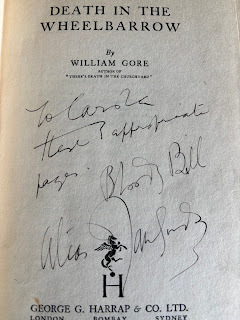
You simply don't come across books with titles like Death in the Wheelbarrow these days. More's the pity, do you think? Anyway, I'd never heard of this book, published in 1935 and written by William Gore, until I was offered a nicely inscribed copy. I do love old books with authorial inscriptions and I succumbed to the temptation to buy it. To be truthful, I wasn't expecting a masterpiece, though I was encouraged to discover that Dorothy L. Sayers had praised Gore's first book, There's Death in the Churchyard. And I must say that I really did enjoy this one enormously. A real find.
William Gore wrote just three detective novels. The name was an alias for an artist called Jan Gordon (actually his precisely correct name was Godfrey Jervis Gordon) and there is an interesting website devoted to Gordon and his wife Cora which contains a great deal of information about them, although not much about this particular book. They sound like an interesting and talented couple. I gather that Gore's crime writing earned him the nickname 'Bloody Bill', a name which features in the inscription in my copy.
This novel has a number of distinct strengths. First, the storyline is unusual and unpredictable. Second, the writing is genuinely witty - one or two lines made me laugh out loud. And third, the plot is pretty good. Even though the pool of suspects is small, I thought Gore juggled suspicion very cleverly. So cleverly that I'd now like to read his other two mysteries.
The body of a mysterious, affluent local man called Eccles in a quiet English village keeps the police guessing. The various detectives are engagingly characterised and so - despite an excess of phonetically rendered dialogue - are the villagers. Gore makes effective and enjoyable use of his artistic know-how in the story and has some fun at the expense of two characters who are nudists. There's also a nicely described trial scene. On this evidence, it's a huge pity that Gore didn't write any more.
May 21, 2025
The Clink

I studied criminology and penology as part of my degree, and in the years since then I've remained very interested in the links between crime and the justice and penal system. I've been involved in initiatives in closed as well as open prisons and a youth offenders' institute. And last week I had a very enjoyable lunch at the Clink restaurant which operates at Styal Women's Prison in Cheshire.
The Clink is a charity which provides opportunities for people in prison to be trained in catering and horticulture. I gather its main outlet is at Brixton Prison, but the Styal operation has been running for a decade. That time was interrupted by the pandemic, ironically just at the time I became aware of it and was about to book a meal for the first time when everything shut down. And now, sadly, the Styal restaurant, which did eventually reopen, is to close permanently.
The closure is said to be due to rising costs and also complications associated with the present government's 'early release' scheme, which apparently makes training more difficult. This is extremely unfortunate, to say the very least, because what I have learned over the years since I first visited a prison as a student is that rehabilitation can work. Sometimes it fails, I am the first to accept that reality, but soundly conceived initiatives such as the Clink should surely be supported to the maximum by the authorities - and by any government which claims it wants to reduce crime.
The Clink restaurant at Styal occupies a former chapel - an impressive space, with very interesting artwork on the walls. The staff were friendly and efficient and the quality of the food was excellent. I'm very glad that I made it to Styal before the closure and I'll try to get back there again before 31 July, when the shutters come down for good.
May 19, 2025
CrimeFest 2025 - the end of an era
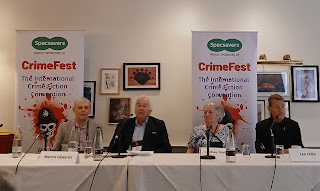
I'm just back from Bristol after yet another excellent CrimeFest. Sadly, it's to be the very last one, although there was an announcement at the banquet by Barry Ryan which suggested that this great festival may re-emerge in some form in future. Fingers crossed! But in the meantime, warmest congratulations to Adrian Muller and Donna Moore for everything they have achieved. It really has been a blast. I've attended since the start, and only missed one, which clashed with a lecture trip on the Queen Mary: there had to be a compelling reason to miss out! So this post is a blend of reminiscences and photos about the weekend, and CrimeFests past. Starting with a proud moment above as part of the Diamond Dagger panel and with my fellow ex-chairs Maxim Jakubowski and Vaseem Khan below.
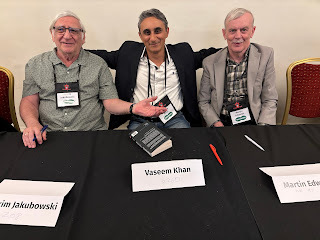
I've got so many happy memories from CrimeFest over the years, far too many to mention here. Interviewing Peter Lovesey was one highlight, being interviewed by Donna, together with Robert Goddard, when I was guest of honour three years ago, was another. Having a drink in the bar with the film director Mike Hodges and discussing Get Carter. Meeting my agent James Wills for the first time. Parties with publishers. Launching The Life of Crime. Lunches and dinners with friends such as Ayo Onatade, Michael Ridpath, Ann Cleeves, and John Curran. Presenting the Diamond Dagger to Peter James and chatting with Martina Cole.
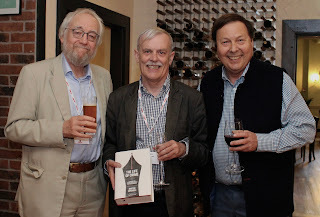
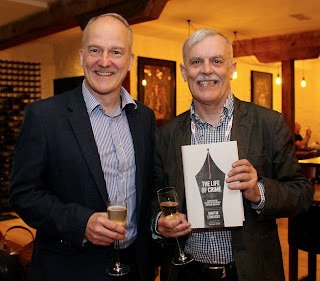
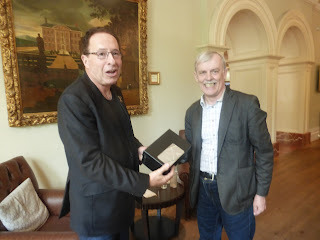
And on a perhaps self-indulgent note, I've been lucky enough to pick up quite a few items of lovely Bristol Blue Glass. Winning the CrimeFest H.R.F. Keating award three times, the first presented by Harry Keating's widow Sheila. Being presented with the inaugural CWA Margery Allingham short story award. Two Criminal Mastermind wins. Quite a few pub quiz wins, too. Plus three eDunnit award shortlistings. But of course, what is most importantly of all is the friends I've met and made. All of them have contributed to this being a must-attend event in my calendar.
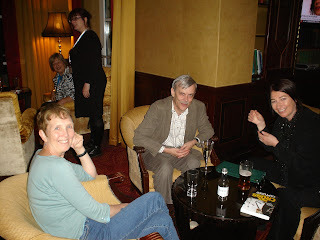
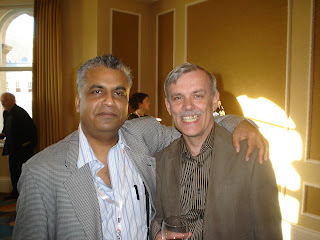
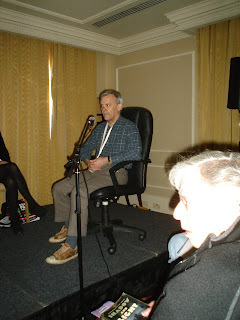
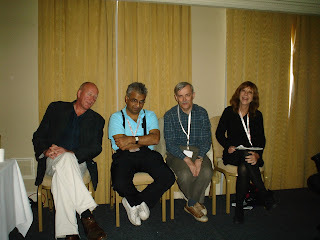
I co-edited with Adrian the anthology Ten Year Stretch, celebrating the festival's first decade, in which my daughter Catherine translated a story by Maj Sjowall, whom I was delighted to meet, and I was also delighted to contribute a new story, 'The Butler', to the new anthology, brilliantly titled Leaving the Scene.
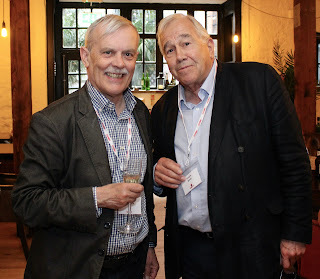
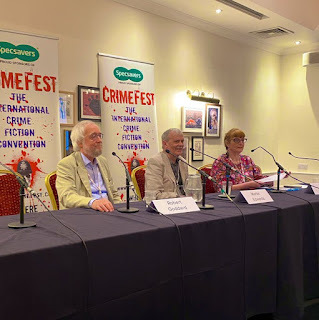
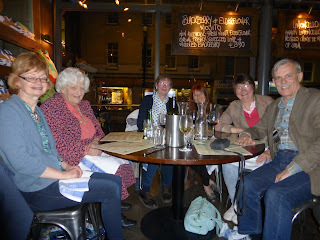
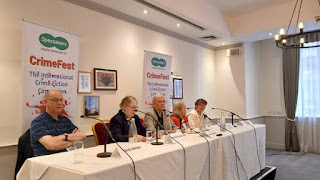
This year began on Thursday with my moderating a panel about Authors Remembered, with David Whittle, Katherine Hall Page (an MWA Grand Master, lovely to spend time with her and her husband Alan again; we'd not seen each other for ages), Christine Poulson, and Dolores Gordon-Smith. (My author, by the way, was Martin Russell.) A convivial dinner with Simon Dinsdale, David Brawn, Sarah Dunnakey and others was followed by Peter Guttridge's final pub quiz. And we did manage to snaffle the prize. Then a good chat in the bar with Peter and Mike Stotter.
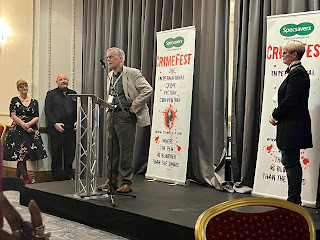
On Friday I did some sightseeing, but also had lunch with Bryan J. Mason and Caro Ramsay and her husband and also bumped into more CrimeFest regulars such as Sue Lord and Zoe Sharp. There was a fun book signing for Leaving the Scene and a chance to catch up with Vas Khan and Maxim Jakubowski. Then James Wills and I recreated our original dinner encounter, recalling how I pitched to him the idea of The Golden Age of Murder...A great evening.
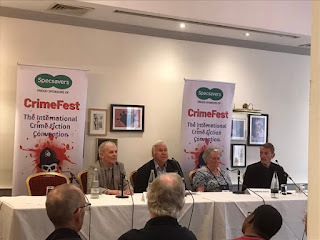
Saturday was busy and I had the huge pleasure of meeting Mark Gatiss for the first time before the Diamond Dagger panel. This was a wonderful standing-room-only occasion moderated by Simon Brett and including Lee Child, Lindsay Davis, and me. We also had the chance to pay tribute to the late Peter Lovesey, and also to feature John Harvey, who was due to attend but unable to make it. Then I recorded a podcast, about which more in the future, and there was the Playing Dead anthology panel with Simon, Ruth Dudley Edwards, Alison Joseph, Len Tyler, and Kate Ellis. The banquet was as good as ever - with Cathy Ace bringing events to an end with great style (as the photo shows, I'd had a chance to catch up with her and her husband in the sunshine earlier!). There was a chance to chat with people like Jeff Siger and Ayo Onatade and to meet Sara Lodge, whose book on Victorian female detectives I discussed here last November.
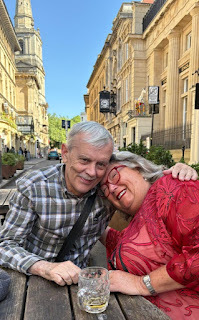
Another panel to kick off Sunday morning, about history-mysteries, with Helena Dixon, Luke McCallin, Sarah Williams, and Dolores, was a lot of fun. But then, because of the nightmare of train cancellations, I had to say my goodbyes. Yet the journey back was great, because luckily for me, Dave Penny offered to give me a lift home and I was glad to get to know him much better - a very interesting companion.
All good things come to an end, but I must say that CrimeFest has been a very good thing. And I'm grateful to everyone who has made it so special to me for so long.
